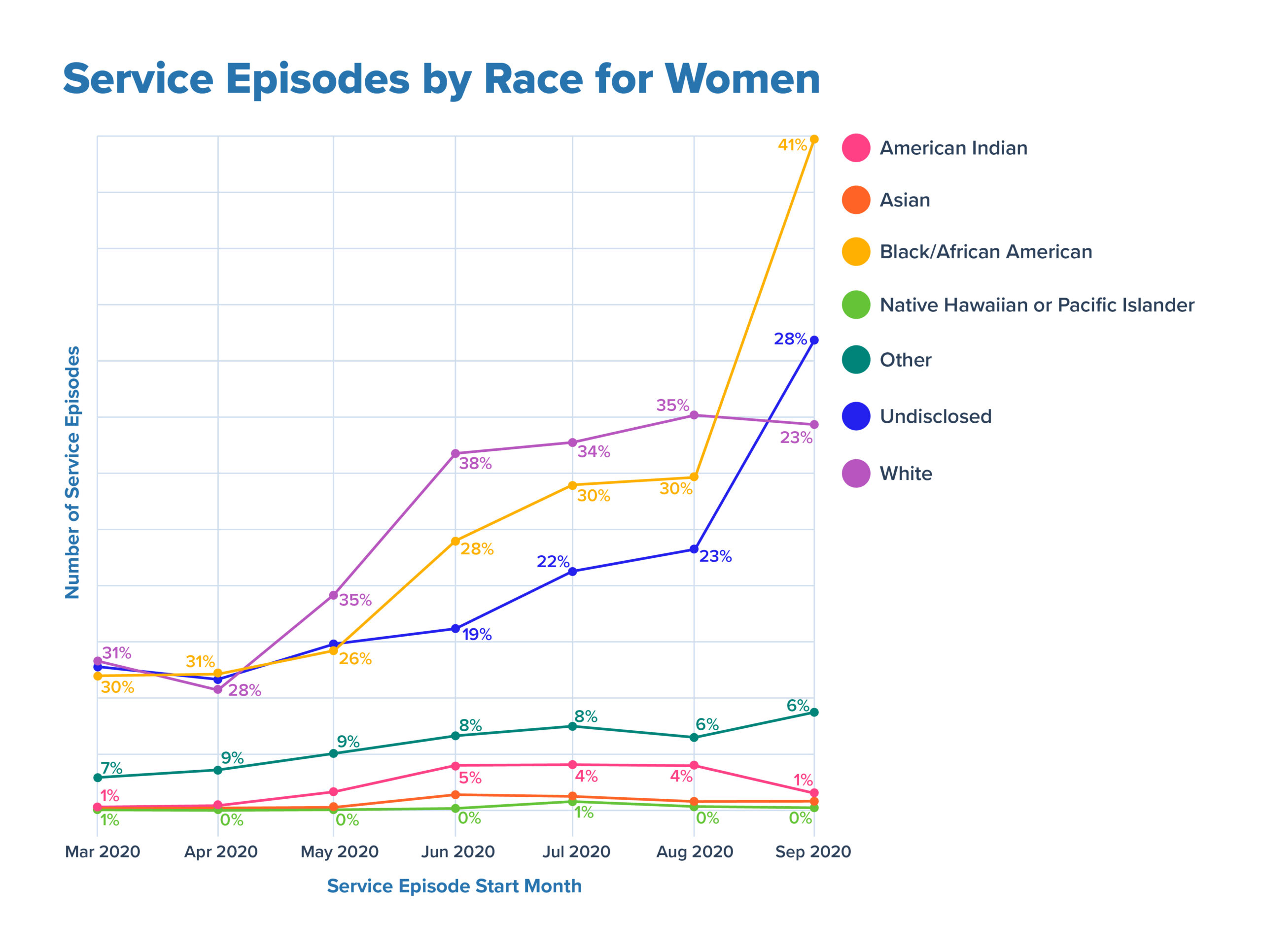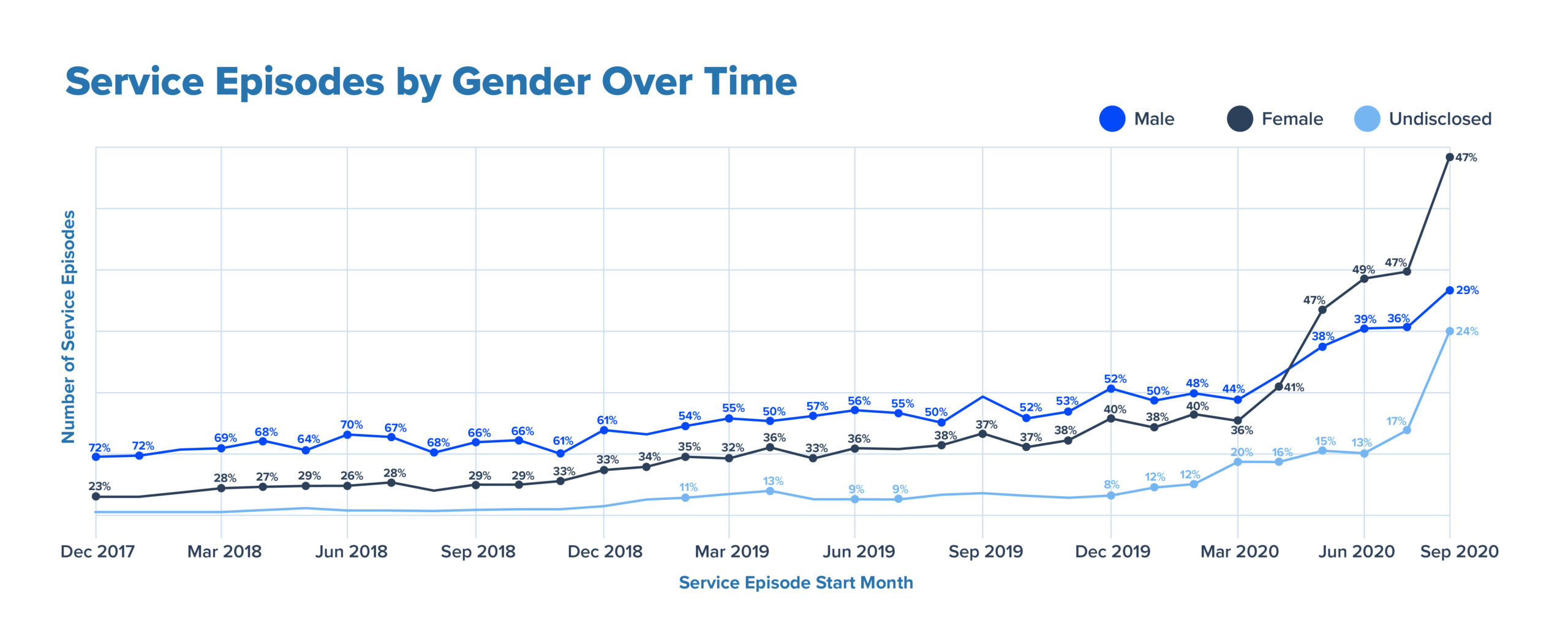
New Social Care Data Show Impact of COVID-19 by Gender and Race
The COVID-19 pandemic has had a disproportionate impact on women, particularly Black women. With over 860,000 women leaving the workforce in September and a staggering job loss number of 5.8 million since February, the economic fallout of COVID-19 may be causing equality setbacks that won’t easily be rectified and could be felt for generations to come.
The National Bureau of Economic Research’s working paper, The Impact of COVID-19 on Gender Equality, cites three main reasons for the disproportionate impact of job losses and workforce changes on women during the pandemic:
- Industries with an overrepresentation of women in their workforces have had more layoffs (e.g. hospitality, government, and healthcare).
- School closures and lack of childcare negatively impact women more.
- Women have fewer opportunities to work remotely.
The authors estimate “that 15 million single mothers in the United States will be the most severely affected, with little potential for receiving other sources of childcare and a smaller likelihood of continuing to work during the crisis.”
Loss of income directly contributes to increased social needs. Women of color report higher levels of food insufficiency as a result of job loss and COVID-19. The Institute for Women’s Policy Research reports:
“Women who have recently lost employment are at least twice as likely to report not having enough to eat compared with those who had not lost employment income. Asian and Hispanic women were nearly 5 times more likely to report not having had enough to eat compared with those who had not lost employment income. Among Black women in households without a loss of employment income since March 13, 12.6 percent report insufficient food compared with 27.7 percent in households that experienced a loss of employment income.”
The network data confirm these trends
With coordinated care networks operating across over 40 states, Unite Us has built the most outcomes-focused, impact-driven social care platform in the country. The data from these networks inform not only community-level decision-making to identify and resolve critical gaps in services, but can also inform state and national level decision-making as we face the most significant health and economic crisis of our time.

The data on the Unite Us Platform show us that women and marginalized populations are struggling. Data from spring 2020, the beginning of the pandemic, show a marked increase in the number of women requesting services, surpassing men for the first time since 2013 when Unite Us was founded. Further, service episodes initiated by Black women are not only increasing, but surging as compared to those initiated by white women. This is indicative of overall current trends that Black and hispanic women are experiencing nearly two times the unemployment rate that white women experience (11.1%, 11%, and 6.9% respectively).

What do women need, and are they getting it?
We see a steady rise across multiple service types among women. In September alone, women initiated two times as many service episodes for both housing and shelter and food assistance as compared to men. Since March, overall service episodes have increased 202%. For women, housing and shelter service episodes have increased 780%, clothing and household goods service episodes have increased 422%, and utilities service episodes have increased 310%.
Our focus on outcomes is a critical difference in our approach to data. Tracking referrals for services alone does not get people the help they need. At Unite Us, we use service delivery and impact as key measures. When we dive deeper and look at the outcome data for women, we see successful care resolution rates for service episodes for food assistance (84%), clothing and household goods (92%), individual and family support (87%), benefits navigation (86%), and housing and shelter (77%). We also see gaps in service and community need in the following resource areas: utilities (60% cases unresolved) and physical health (45% unresolved). It is critical to track both the request and the resolution status of these types of services, instead of just sending referrals off in an unanswered silo. This is actionable information our partners use to respond in real-time with investment shifts, and our networks can respond with targeted community-based organization (CBO) recruitment and on-the-ground community engagement support.
Navigating a new normal: response to changing needs
Connecting people to the care they need is now more critical than ever. With unprecedented numbers of women impacted by job losses and workforce changes due to COVID-19, communities will need to respond to these women and their families’ needs. Our networks are rapidly responding and evolving to meet Americans’ changing social needs during this challenging time. Our intuitive and seamless technology, coupled with our experts working locally on the ground, can transform your community’s ability to respond to this crisis.
Join us to build a solution fortoday, tomorrow, and the future:


